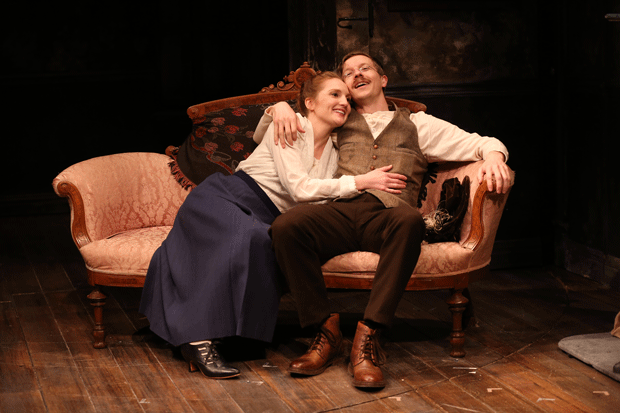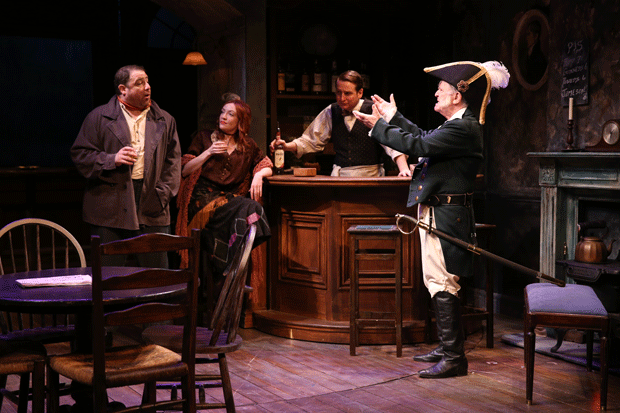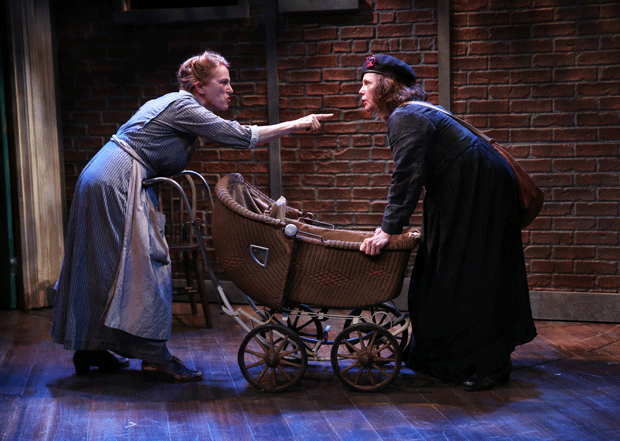The World Comes Undone in Sean O'Casey's The Plough and the Stars
O’Casey’s dark tale of war completes Irish Rep’s production of his Dublin trilogy.

(© Carol Rosegg)
Sean O'Casey's first three plays — The Shadow of a Gunman, Juno and the Paycock, and The Plough and the Stars — deal with Ireland's bloody conflicts with England at the beginning of the 20th century. Often referred to collectively as the Dublin trilogy, each of them is considered a masterpiece in its own right, and each features O'Casey's masterful blend of comic and tragic craftsmanship. It's not necessary to see all three to understand their stories, but together they have a thematic unity — namely, war turns human beings into their worst selves. And now, in an impressive hat trick, Irish Repertory Theatre has achieved something monumental with its brilliant productions of all three, which are now running in rep through June.
The Plough and the Stars has the distinction of being the bleakest, most dismal of the three, despite the knee-slapping humor of the first scenes. The play takes place around the time of Easter Rising of 1916, in which over a thousand Irish Republican soldiers declared independence for Ireland and engaged in a bloody battle with British forces that resulted in the deaths of hundreds of civilians and the injuries of thousands.
Like the previous two plays, The Plough and the Stars opens in a Dublin tenement. This tenement is occupied by Jack Clitheroe (Adam Petherbridge), his wife Nora (Clare O'Malley), and Nora's Uncle Peter (Robert Langdon Lloyd). We see the working-class, day-to-day lives of the Clitheroes and their neighbors who drift in and out — some of them welcome, like the workingman Fluther Good (Michael Mellamphy) and the young socialist Covey (James Russell); and some of them not, like the violently argumentative fruit vendor Bessie Burgess (Maryann Plunkett), whose son is off fighting for the British and whose daughter Mollser (Meg Hennessy) is dying of consumption. O'Casey's talent for humor comes off frequently in this opening scene, with comical moments in which Covey relentlessly taunts the elderly Peter.

(© Carol Rosegg)
Tension later builds in a public house called the Plough and the Stars, where Dubliners gather to hear pro-independence speeches and drink at the bar in the company of the prostitute Rosie (Sarah Street). The play's depiction of the gradual breakdown in civilized behavior is symbolized by fights that break out between Bessie and the charwoman Mrs. Gogan (Úna Clancy), and between Covey and Fluther. Months later, the city has collapsed into a state of anomie, with Dublin a complete war zone. People begin to loot with impunity, even at the risk of being shot accidentally, and bodies lie in the street. Despite the carnage, there are sparks of human kindness that briefly light the darkness, as when Bessie tends to the mentally frail Nora, who fears she has lost her husband, but such brief sparks are quickly extinguished by the horrific beast of war.
Director Charlotte Moore has done an outstanding job eliciting the humor of the first two acts before immersing us in the tragic events of the play's second half. The cast is exceptional, with hilarious performances by Russell and Langdon Lloyd, who make a magnificent comic duo, and by Mellamphy, who is perfectly cast in as the hardworking carpenter Fluther. Maryann Plunkett also stands out for her furious yet ultimately kindhearted portrayal of Bessie Burgess.
Charlie Corcoran's impressive revolving set (unique to this play in the trilogy) transforms from the tenement interior to the bar, and later to the tenement exterior, and finally to Bessie's room, each scene growing darker and more foreboding with the deepening shadows of Michael Gottlieb's lighting design. The set is rich with details, from a tea kettle on the stove to the cracked glass of Bessie's windows.
One of the theater's foremost antiwar playwrights, O'Casey is unsparing in his depiction of violence in The Plough and the Stars, and Irish Repertory Theatre has produced this trilogy in three equally unsparing and masterfully executed productions that convey the horror of armed conflict and the animalistic human folly that precipitates it. One hundred years later, it's chilling to recognize these characters' worst instincts in ourselves.

(© Carol Rosegg)








